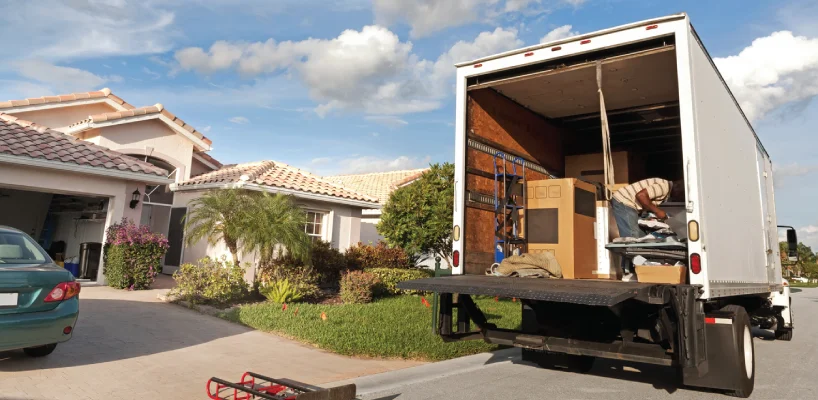Moving a house is like turning the page of a cherished book; it preserves its story while offering new opportunities and adventures.
We are not talking about packing up your belongings and relocating. We mean literally digging up your house and transporting it to a different town or state.
While it sounds extreme, moving a house is straightforward with a team of professionals. However, deciding to move your home can be challenging. You might have weighed the pros and cons of remodeling versus moving and decided you want to do both. Moving your house makes that possible, but it's hard to decide without knowing how much does it costs to move a house.
Let’s find out what affects house moving costs, break down expenses by distance, house type, and size, and give tips to reduce these costs.
Planning to tip your movers? Find out the etiquette and considerations on How Much To Tip Movers - Etiquette, Considerations And More.
How Do You Move a House?
Moving a house involves several key steps.
First, you need to obtain the necessary permits and inspect the house for structural soundness. Then, disconnect all utilities like electricity, gas, and water. The house is then lifted off its foundation using hydraulic jacks and supported with steel beams.
It's loaded onto a specialized trailer for transport to the new location, following a carefully planned route. Once at the new site, the house is lowered onto a prepared foundation, utilities are reconnected, and any necessary adjustments or repairs are made to ensure stability and safety.
Deciding between a hand truck and a dolly for your next move? Find out which one suits your needs best with our guide: Hand Truck Vs Dolly – Which One To Choose.
How Much Does It Cost to Move a House?
Curious about how much does it costs to move a house? The cost varies significantly based on the method of relocation, the destination, the size of the house, and the distance traveled.
According to a survey, moving a house typically costs between $12 and $16 per square foot. For instance, relocating a 1,500-square-foot home could range from $18,000 to $24,000. However, larger homes or longer distances may result in expenses reaching up to $200,000. On the lower end, some moves could be as affordable as $15,000.
Curious about your moving costs? Fill out the details, and we’ll calculate them for you.

Let's break down these costs further.
Analyzing refrigerator weights and sizes? Get tips on Refrigerator Weight Analysis - Tips & Size Selection.
Moving Cost by Distance
Moving costs can vary based on the distance traveled. Here's a breakdown:
Short-Distance House Moving Cost
| Property Size | Average Weight | Estimated Time | Cost Range | Complexity |
|---|---|---|---|---|
| One-bedroom home | 3,500 pounds | 3-5 hours | $2500 - $550 | Low |
| Two-bedroom home | 5,000 pounds | 5-7 hours | $300 - $800 | Medium |
| Three-bedroom home | 10,000 pounds | 7-10 hours | $500 - $1,200 | High |
| Four-bedroom home | 12,000+ pounds | Above 10 hours | $700 - $2,200 | Very High |
Long-distance House Moving Cost:
| Moving Distance | Standard Cost (USD) | Including Packing (USD) | Including Mover’s Insurance (USD) | Including Insurance & Packing Services (USD) |
|---|---|---|---|---|
| 100 miles | $2,500 | $3,500 | $3,100 | $3,700 |
| 500 miles | $3,500 | $4,100 | $4,200 | $4,700 |
| 1,000 miles | $4,500 | $5,100 | $5,200 | $6,500 |
| 3,000 miles | $9,500 | $10,300 | $10,200 | $10,700 |
Exploring double-wide mobile homes? Discover all you need to know on Double Wide Mobile Homes.
Moving Cost by Type of House
The cost of moving can vary significantly depending on various factors such as distance, size of the home, and additional services required.
Here's a general breakdown of moving costs for different types of houses:
Traditional Home
Moving to a traditional home can be expensive due to several factors. These include differences in structure, shape, and any added features like plumbing or wiring.
Many traditional homes also have complex landscaping, making removal more difficult. Costs can vary widely, ranging from $15,000 to $200,000.
Mobile Home
Mobile homes are built for easy movement, so the process of relocating them is simpler. Unlike traditional houses, their design makes moving straightforward, reducing many cost factors.
Typically, moving a mobile home costs between $700 and $20,000, with an average of $7,000. While factors like distance and route still matter, they're usually less influential than for traditional homes. Experienced movers who specialize in mobile homes are best for this job.
Transitioning to a new apartment? Stay organized with our checklist When Moving To A New Apartment!
Moving Cost by Size of House
The expense of relocating a house correlates with its size, with smaller homes being more straightforward and less costly to lift and transport.
| Size of House (Square Feet) | Cost Range (USD) |
|---|---|
| 500 Square Feet | $5,900 - $8,100 |
| 1,000 Square Feet | $12,100 - $16,250 |
| 1,500 Square Feet | $18,150 - $24,139 |
| 2,000 Square Feet | $24,120 - $32,430 |
| 2,500 Square Feet | $30,420 - $40,730 |
| 3,000 Square Feet | $36,100 - $48,250 |
| 3,500 Square Feet | $42,250 - $56,410 |

Roughly 70% of all relocation projects involve house moves within a 50-mile radius.
Factors Influencing House Moving Costs
The cost of moving house can vary depending on several factors. Here are some key considerations that can influence the overall cost:
- Property Attributes: The size, shape, and construction type of the house significantly impact relocation expenses. Larger or more intricately designed homes generally require more resources and effort to move.
- Additional Features: Accessories like decks, garages, and porches contribute to the total moving expenses. Transporting these features alongside the house adds extra time and resources to the relocation.
- Spatial Constraints: Limited working space around the property can increase the difficulty and cost of relocation. Insufficient space may require the use of specialized equipment, resulting in higher expenses.
- Travel Distance: Longer distances incur higher transportation costs and may require additional route planning. Local moves within the same vicinity are generally more cost-effective than long-distance relocations.
- Labor Requirements: Skilled professionals are essential for various stages of the relocation process, impacting labor costs. The expertise required and the project duration influence the overall expense of hiring movers.
- Foundation: Building a new foundation costs between $4 to $35 per square foot, averaging $5,150 to $19,365. Houses with taller foundations are easier to move than those on slabs or piers.
- Utilities: Setting up utilities, including electricity, water, gas, and septic systems, ranges from $9,250 to $34,540, depending on site condition and remoteness.
- Permits: Depending on the location, securing permits for house transportation, foundation work, and utility setup can cost from $430 to $5,210. Ensure all necessary permits are obtained before commencing work.
- Lifting: Raising a house, with costs ranging from $10,230 to $40,560, is suitable for adding a basement or increasing ceiling height while keeping the house in its current location.
Need a hand moving furniture? Explore our Helpers to Move Furniture guide to find the best helpers for the job.
Pros and Cons of Moving a House
Moving your house can enable you to maintain your residence or protect a historic property, yet it involves significant complexity and expense, potentially risking damage to your home.
Here's an analysis of the pros and cons of moving a house:
| Pros | Cons |
|---|---|
| Preserving Family Home | Extensive Planning |
| Portability | Potential Unexpected Costs |
| Enjoying Upgrades | Cost Considerations |
| Avoiding House Hunting | Disassembly and Reassembly |
| Cost-effective Alternative to Buying New | Utilities Disconnect and Reconnect |

Around 80% of the total cost of moving a house comprises labor and transportation expenses.
How to Reduce House Moving Costs? - Pro Tips
Reducing house moving costs can save you a significant amount of money. Here are some pro tips to help you cut down on expenses:
- Plan Ahead: Start planning your move well in advance. Rushing can lead to higher costs as you may not have time to compare prices or find the best deals.
- Declutter: Before packing, go through your belongings and remove items you no longer need or use.
- Get Multiple Quotes: Don’t settle for the first moving company you come across. Shop around and get quotes from multiple movers to compare prices and services.
- Choose the Right Time: Moving during peak times, such as weekends or holidays, can be more expensive. If possible, try to schedule your move during off-peak times to save money.
- Pack Yourself: Packing services provided by moving companies can be costly. To save on these expenses, consider packing your belongings yourself.
- Use Free Boxes: Instead of buying new moving boxes, try to find free boxes from grocery stores, liquor stores, or online marketplaces.
- Negotiate: Don’t be afraid to negotiate with moving companies to see if they can offer you a better rate or any discounts.
- Check for Tax Deductions: In some cases, moving expenses may be tax-deductible, especially if you’re moving for work-related reasons.
Smoothen your move-out cleaning process with this Effective Move-Out Cleaning Checklist!





